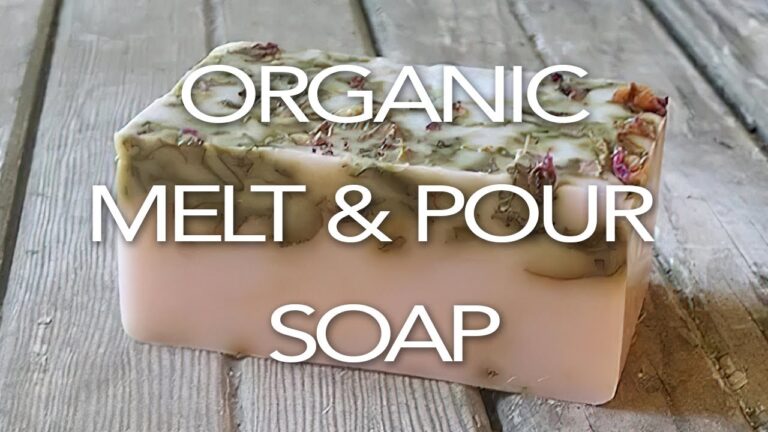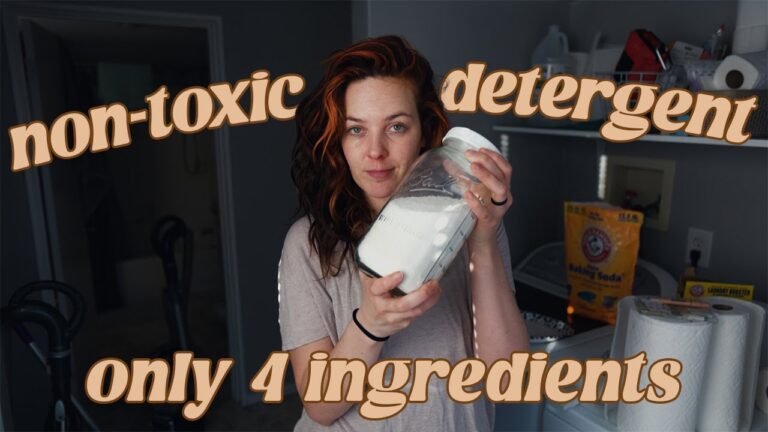Are you tired of using chemical-laden soaps that irritate your skin? Why not try creating your own natural soap at home? Making your own soap is easier than you think, and it allows you to control the ingredients, ensuring a gentle and nourishing product for your skin. In this article, we will guide you through the process of making your own natural soap, using simple and natural ingredients. Say goodbye to harsh chemicals and hello to a more natural and eco-friendly way of cleansing your skin.
- Use natural ingredients such as oils, lye, and essential oils
- Follow safety guidelines when working with lye
- Experiment with different scents and colors for personalized soap
- Allow the soap to cure for several weeks before using
What are the primary components in homemade soap?
Handmade soap is a simple yet powerful combination of oil, water, and lye. These three basic ingredients work together in a chemical process called saponification to create soap. The oils used can vary, ranging from olive oil for a gentle moisturizing soap, to coconut oil for a rich lather.
In addition to the essential trio of oil, water, and lye, homemade soap often includes other ingredients to enhance its benefits. Common additives include shea butter for extra moisture, essential oils for fragrance, and natural colorants like clays or herbs. These additional ingredients can tailor the soap to specific skin types or preferences, making each bar unique and special.
Whether you’re looking for a soothing lavender-scented soap or a deeply moisturizing bar, the main ingredients in homemade soap can be customized to create the perfect blend for your skin. By understanding the chemistry behind soap-making and experimenting with different oils and additives, you can craft a luxurious and personalized soap that nourishes and pampers your skin.
Is homemade soap beneficial for your skin?
Homemade soap is a fantastic choice for your skin, as it is made with natural ingredients that are gentle and safe for all skin types. Unlike commercial soaps that often contain harsh chemicals and synthetic fragrances, handmade soap can help to nourish and protect your skin. With its ability to reduce inflammation, improve circulation, and promote healthy skin cell growth, homemade soap is a great option for maintaining healthy and glowing skin.
The benefits of using homemade soap extend beyond just cleansing the skin. With its natural ingredients, handmade soap can provide additional benefits such as moisturizing, exfoliating, and soothing the skin. By incorporating handmade soap into your skincare routine, you can help to restore and maintain the natural balance of your skin, leaving it feeling soft, smooth, and rejuvenated.
Overall, homemade soap is a superior choice for your skin compared to commercial alternatives. With its gentle and natural ingredients, handmade soap can help to improve the overall health and appearance of your skin. By making the switch to homemade soap, you can enjoy the benefits of cleaner, healthier, and more radiant skin.
How can eco-friendly soap be made without lye?
Are you looking for a more environmentally friendly soap option that doesn’t involve using lye? Look no further! One way to make eco-friendly soap without lye is by using a melt and pour soap base. These bases are already pre-made and only require melting, adding in your desired ingredients such as essential oils or exfoliants, and then pouring into molds to set. This method eliminates the need for lye, making it a safer and easier alternative for those looking to make their own soap at home.
Another option for making eco-friendly soap without lye is by using a cold process method with ingredients such as coconut oil, shea butter, and plant-based oils. By carefully following a recipe and using natural ingredients, you can create a gentle and nourishing soap without the use of lye. This method may take a bit more time and effort compared to melt and pour bases, but the end result is a homemade soap that is both eco-friendly and beneficial for your skin. So go ahead and try your hand at making your own eco-friendly soap without lye today!
Crafting Your Own All-Natural Soap
Are you tired of using store-bought soaps filled with harsh chemicals and artificial fragrances? It’s time to take control of what you’re putting on your skin by crafting your own all-natural soap. Not only is making your own soap a fun and creative process, but it also allows you to customize the ingredients to cater to your specific skin needs. Whether you have sensitive skin, dry skin, or acne-prone skin, you can tailor your soap recipe to address your concerns and leave your skin feeling clean and nourished.
When crafting your own all-natural soap, the possibilities are endless. You can choose from a wide variety of natural ingredients such as essential oils, herbs, and botanicals to create a soap that not only cleanses but also rejuvenates and moisturizes the skin. Additionally, by using natural ingredients, you can avoid the harmful chemicals found in many commercial soaps, making it a healthier choice for both you and the environment. With a little bit of research and experimentation, you can develop a soap recipe that is not only effective but also sustainable and eco-friendly.
So why settle for generic, mass-produced soaps when you can create your own luxurious and nourishing all-natural soap at home? With the right ingredients and a little bit of creativity, you can craft a soap that is tailored to your skin’s needs and free from harsh chemicals. Embrace the art of soap-making and treat yourself to the soothing and therapeutic experience of crafting your own all-natural soap.
Easy Homemade Soap Recipes
Looking to create your own luxurious soap at home? Look no further than these easy homemade soap recipes that are sure to impress. From soothing lavender to invigorating citrus, these recipes cater to a variety of preferences and skin types. With simple ingredients and clear instructions, you’ll be on your way to crafting beautiful, nourishing soaps in no time. Say goodbye to store-bought soaps and hello to a fun and rewarding DIY project that will leave your skin feeling soft and rejuvenated.
Simple Steps to DIY Natural Soap
Are you looking to make your own natural soap at home? Look no further! With just a few simple ingredients and easy-to-follow steps, you can create luxurious and nourishing soap bars that are free from harsh chemicals. By using natural oils, essential oils, and lye, you can customize your soap to suit your skin type and preferences. With our step-by-step guide, you’ll be on your way to creating your own personalized natural soap in no time!
Start by gathering your ingredients and equipment, then follow our detailed instructions to safely and effectively make your own natural soap. From choosing the right oils to mastering the art of scent blending, you’ll have all the tools you need to create a truly unique and skin-loving product. Say goodbye to store-bought soaps filled with synthetic ingredients, and hello to a more natural and eco-friendly alternative. Give our simple steps a try and discover the joy of DIY natural soap making today!
Incorporating natural ingredients into homemade soap not only allows for a personalized touch, but also promotes a healthier lifestyle by avoiding harsh chemicals often found in commercial products. By following simple recipes and experimenting with various scents and textures, individuals can create their own unique bars of soap that are gentle on the skin and environmentally friendly. Embracing the art of soap making at home not only provides a creative outlet, but also encourages a more sustainable approach to personal care. So why not start today and experience the joy of crafting your own natural soap?



